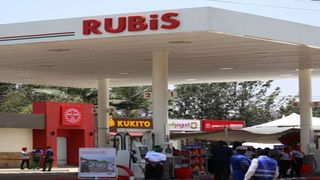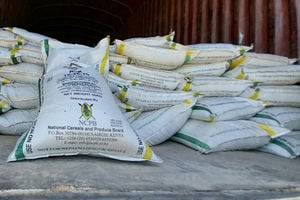
Rubis Energy Kenya fuelling station at the United Nations Avenue in Gigiri, Nairobi.
| File | Nation Media GroupBusiness
Premium
Rubis inks deal to operate National Oil in rescue plan
French oil multinational Rubis is set to become the strategic investor in National Oil Corporation of Kenya (NOC Kenya) in a deal aimed at reviving the struggling State-owned oil firm.
A government official privy to the matter told this publication that NOC Kenya and Rubis have already sealed the agreement and were at the end of last week awaiting the approval of Attorney-General Justin Muturi.
“The deal between Rubis and NOC Kenya is already agreed and is now on the AG’s (Attorney-General’s) table for approval,” said the official.
NOC Kenya had been given up to the end of October last year to onboard an oil company that is expected to inject at least
Sh5 billion for working capital and revamping its more than 100 fuel stations across the country.
Under the deal, NOC Kenya will continue running its fuel stations but will share profits with Rubis, as a way of paying back the French oil marketer for the billions of shillings that it will invest.
It is not clear how much money Rubis will pump in under the deal.
NOC Kenya had last year said that it was looking for a strategic investor who would provide at least Sh5 billion -- Sh3 billion being for working capital and the rest for revamping the over 100 fuel stations countrywide.
The State-owned oil firm is in a precarious financial situation, with current liabilities for the year ended June 2021 having exceeded current assets by Sh6.3 billion, rendering it technically insolvent.
The deal with Rubis is set to breathe new life into NOC Kenya as it eyes regaining its footing in a market dominated by well-oiled multinationals while offering Rubis an upper hand in its efforts to dislodge TotalEnergies Marketing Kenya as the second biggest oil major in Kenya.
Efforts to get a comment from Rubis and NOC Kenya were unsuccessful as both parties declined to officially comment on the matter.
NOC Kenya had in October last year sounded out Rubis, Total and Vivo Energy as it sought to establish which of the three oil majors were keen on a partnership. Rubis is the only major that returned a positive response, setting the stage for talks.
At its prime, NOC Kenya had a retail footprint of 110 service stations that included 13 stations acquired from BP in 2009 and 33 stations acquired from Somken 16 years ago.
But years of perennial struggles and losses hit NOC Kenya’s competitiveness, cutting its market share to less than one percent as at the end of last year. The deal would also hand Rubis a major boost in its quest to become the second biggest oil firm in Kenya after market leader, Vivo Energy.
Rubis increased its market share to 14.05 percent in December last year from 12.43 percent six months earlier, bringing it on par with Total at 14.88 percent. Vivo dominates the market with a share of 22.07.
NOC Kenya had earlier said that it was targeting a deal that would run for at least eight years, open to renewal based on performance.
The Cabinet had given NOC Kenya up to the end of September last year to onboard the strategic investor but the deadline was pushed back by a month amid delays by the Treasury in approving the procurement process.
Multi-billion shilling loans from KCB Group and Stanbic Bank that NOC Kenya has defaulted on stood in the way of the deal, amid concerns that this would turn a potential partner off.
KCB Group’s loan hit Sh6.35 billion as at June last year from an original amount of Sh3.59 billion while that from Stanbic jumped to Sh2.21 billion in the same period from an initial amount of Sh1.3 billion.
But the Treasury early this year committed to pay the loans as it sought to clear the path for NOC Kenya to get a strategic partner.





